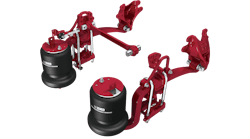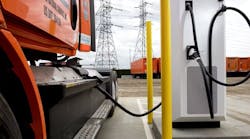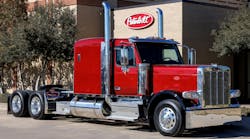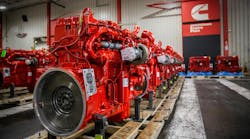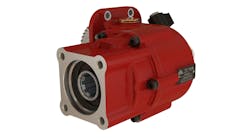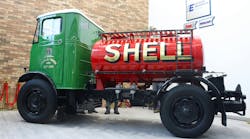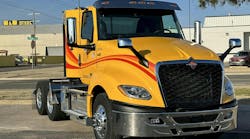FREIGHTLINER describes it as “the first-ever diesel electric hybrid fuel truck.” With apologies to Toyota, Diesel Direct president Dan Abrams calls it “a Prius on steroids.”
However you describe it and whatever you call it, the innovative Freightliner Business Class M2 106 Hybrid has been a remarkable success, currently delivering fuel to fleets in Massachusetts.
“I've got a lot of trucks,” Abrams says, “and we love this truck. It's just beautiful. I'm really enthused about it. I think it's great stuff. My maintenance and operations people like it so much that they ask me, ‘Can we look at some more Freightliners?’ I said, ‘Absolutely.’ In five months, we had one little problem and they fixed it immediately. Dependability has been better with this truck after five months of service than my other trucks.”
The truck uses the Eaton Hybrid Electric Drivetrain System, a parallel hybrid system that enables the truck to operate using the diesel engine alone, or in combination with the hybrid electric motor.
Abrams says it is perfectly suited for the application needed by his Boston-based company.
“We have so many routes and so many vehicles around the country, but we've got it on the right route -at night, where a driver does 10-14 stops of mobile refueling in a suburban setting, running an average of 75 miles while delivering 2,600 gallons of fuel to a multitude of customers,” he says. “Between stops, the batteries are building up their power so by the time we get to the stop, the truck's shut off and we're pumping on the electric motor, so there's no idling.
“Nobody is complaining about a smoky truck in their yard. We're not burning fuel, so we're saving fuel. We refuel a lot of school buses, and they're often parked in residential neighborhoods. So we're pulling into a yard at 10 at night. Isn't it much nicer to pump much quieter and not wake up people?
“We can go 12-16 minutes of electric pump time before the truck's motor has to start up. If it starts up, it may run 10-15 minutes and then can pump another 10-15 minutes solely on electric power. However, we believe we can get twice as much pump time using the electric motor by retrofitting a switch that would only allow the electric pump to operate while fuel is flowing. We are losing approximately 20 seconds making the transfer from one customer truck fuel tank to the next.
“We're exceeding the 30% mark on fuel savings because we're getting it from a boost of the hybrid going down the road and also because we don't have to have the truck idling and burning fuel while pumping. We'll save on other maintenance, although it will be tough to figure exactly. If that motor is not turning, the less the truck idles, the better off we are and the longer life the motor will have. I know we're going to save, because we're braking with the kinetic part.”
Abrams says that as he was researching the truck, he was a bit reticent about the power the truck would provide. His company primarily uses trucks with Cummins ISC 330-horsepower engines, and this truck has an ISB 240-hp engine.
“But it has 750 ft-lbs of torque when working in concert with the hybrid, so it winds up having plenty of power,” he says. “We have hills and flat roads, and I thought I'd have issues with our drivers. They have no issue with the power. The truck has performed terrific.”
In May 2009, Abrams learned that the Department of Energy Resources in Massachusetts was awarding 10 grants of up to $40,000 each for companies purchasing hybrid vehicles. A former mechanical engineer, he always had an interest in hybrids and saw them work successfully in Coca-cola fleets that Diesel Direct currently services.
He believed a hybrid would work superbly for an oil truck, so he contacted various truck manufacturers to learn the up charge and logistics. He had to have a purchase order signed by December 31, 2009. He ran into difficulty finding a manufacturer that would certify that the truck's engineering would be approved for the application by that deadline, but Freightliner came through and he took delivery of the truck in May.
The truck has an Eaton six-speed Ultrashift automated transmission with Cummins ISB engine, and air-ride suspension. It is equipped with a MidCom eCount computer with scanners and Diesel Direct's proprietary software, along with a Trans-Tech 2,800-gallon cargo tank.
He says Eaton's engineers did a great job in developing a fuseable link as a safety so the circuits are protected, and a mercury switch inside the hood that cuts the power so the engine won't start inadvertently if somebody lifts the hood.
“They also designed it in such a way that if something happens to the hybrid side, we're not out of business,” he says. “We just switch over to the mechanical mode, which is really important. So you don't have to have a fear about it and go, ‘Oh my gosh, if this hybrid doesn't work, I won't get my fuel delivered.’ It's been well thought-out.”
He said the grant covered the $40,000 up charge, but he's considering buying more trucks, even if there is no grant attached.
“$40,000 is pricey,” he says. “People are not just going to dig into their pockets for $40,000. But like anything else, as they come down in price, there will be an intersection on the charts where you say, ‘Wait a second, this really makes sense. We're saving this much fuel and will have a payback in four or five years if we run the truck 50,000 miles per year.’
“It fits our plans. Oil trucks run for a much longer time than the typical truck. I'm running a vocational truck. The tank and equipment cost as much as the chassis. So if you look at a typical tandem oil truck today that might cost $185,000 or $190,000, half the cost is chassis and half the tank. I come out of the truck leasing industry. I used to own 4,000 trucks. I know the predicted life. These vehicles are different. You can run oil trucks. You're not going to just give it up, not with this kind of vocational sophistication. You're not going to turn them in five, six, or seven years. You turn them in 12 to 13 years. Even $40,000 can work for me in my business.”
But regardless of how the economics work out, he says it's just the right thing to do as America tries to go green.
“I'm a fuel distributor, and people say, ‘Why would you want to save fuel?’ ” he says. “I just say, ‘C'mon, you want to save the country? You want to not be dependent on oil? Just conserve, be smarter about what you do.’
“I believe I'll find more customers who share my philosophy. We could save a lot of fuel if people took trains and buses and used hybrid vehicles of this nature. There's a lot of stuff out there that doesn't work. This works. It's just a question of getting the manufacturing costs down and getting more of these on the road.”
Simple concept
Abrams started Diesel Direct in 1998 without a truck, but his subcontractor couldn't keep up with his ambition of adding customers, so he purchased two Freightliner trucks in April 1999.
Abrams' specific purpose was to fuel truck fleets when they were idle. The concept was simple: reduce operational costs by bringing the fuel to the truck instead of the truck to the fuel. The savings were huge.
Diesel Direct uses custom-designed delivery trucks to provide on-site diesel refueling services to national, regional and local fleets, tanks and equipment throughout the United States. One of the nation's largest mobile refuelers, Diesel Direct delivers fuel to Fortune 500 firms and private companies from Maine to Virginia, and, with the purchase of a West Coast company 18 months ago, to northern California.
For the past 12 years, the company has grown 20% a year every year, and now has 14 locations.
“We've been able to build up to a fairly large size,” he says. “We do only mobile refueling. We don't do it in quite the same way as the rest of the world. We don't service any other markets in the petroleum industry.
“I come out of the truck fleet industry. Most mobile refuelers are adjuncts to something that already exists. In colder climates, they are heating oil companies looking for ways to make money off trucks that do a double shift at night in fueling truck fleets. That's all fine and good, but you're serving two masters. Not an easy thing to do. I know that from truck leasing. A truck dealer wants to become a truck leasing company because he thinks he's losing a lot of business to leasing companies, so he says, ‘Well, I'll go lease trucks, too.’ They're the same animal, but have different stripes. And different agendas.
“All we do is mobile refueling. It's a different mindset. It's not an easy thing to do — to go out and work all night every night. You're only as good as your last delivery. You can have a customer for 10 years and give perfect service, touching many trucks. You don't do something right, and all of a sudden, they're unhappy. It's a very focused business.
“Our people are not just truck drivers, billing clerks, operations people. They're career people. We run with best practices.”
He says he thinks he's the only person in the country who's ever built a refueling simulator that is used to as a learning tool to drill drivers. He recreated a tank truck that he calls the Diesel Direct Fuel Simulator, putting in water and changing the viscosity and coefficient of friction make it act like diesel. A driver pumps into a saddle tank 75 feet away.
“We rig it just like they would do in the cockpit of a simulator for an aircraft,” he says. “So if something happens because of a spill, we time the driver to see how quickly he can identify the source of the leak and contain it.
“We have training films and best-practices standards on how to deliver mobile refueling. I don't think there is enough training in this industry. People hire guys, put them through a course for a few minutes and say, ‘Here, you've got a hazmat, see you later.’ I don't believe in that. I believe in training, repetition. Teach somebody right. Don't just walk away.
“We're specialists and we want to be the best at what we do, so we keep developing best practices to keep everybody safe. The next step is this hybrid, because it fits our business model. I truly believe everything about this diesel electric hybrid truck is advantageous.”
